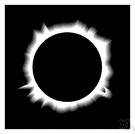occultation
Also found in: Thesaurus, Medical, Encyclopedia, Wikipedia.
oc·cul·ta·tion
(ŏk′ŭl-tā′shən)n.
1. The act of occulting or the state of being occulted.
2. Astronomy
a. The passage of a celestial object across the line of sight between an observer and another celestial object, as when the moon moves between Earth and the sun in a solar eclipse.
b. The progressive blocking and unblocking of light or other electromagnetic radiation from a celestial source during such a passage: a lunar occultation of a quasar; a planetary occultation of a star.
c. An observational technique for determining the position or radiant structure of a celestial source undergoing such occultation or of the object causing the occultation.
3. Islam The temporary, supernatural removal of a holy person from visible existence, as Shiites believe is the case with the 12th imam.
[Middle English occultacion, from Latin occultātiō, occultātiōn-, from occultātus, past participle of occultāre, frequentative of occulere, to conceal; see occult.]
American Heritage® Dictionary of the English Language, Fifth Edition. Copyright © 2016 by Houghton Mifflin Harcourt Publishing Company. Published by Houghton Mifflin Harcourt Publishing Company. All rights reserved.
occultation
(ˌɒkʌlˈteɪʃən)n
1. (Astronomy) the temporary disappearance of one celestial body as it moves out of sight behind another body
2. the act of occulting or the state of being occulted
Collins English Dictionary – Complete and Unabridged, 12th Edition 2014 © HarperCollins Publishers 1991, 1994, 1998, 2000, 2003, 2006, 2007, 2009, 2011, 2014
oc•cul•ta•tion
(ˌɒk ʌlˈteɪ ʃən)n.
1. the passage of one celestial body in front of another, thus hiding the other from view: applied esp. to the moon's coming between an observer and a star or planet.
2. the act of blocking or hiding from view.
3. the resulting hidden or concealed state.
[1375–1425; late Middle English < Latin occultātiō concealment]
Random House Kernerman Webster's College Dictionary, © 2010 K Dictionaries Ltd. Copyright 2005, 1997, 1991 by Random House, Inc. All rights reserved.
oc·cul·ta·tion
(ŏk′ŭl-tā′shən) The passage of a celestial object between an observer and another celestial object, blocking the second object from view. An occultation occurs when the moon moves between Earth and the sun in a solar eclipse.
The American Heritage® Student Science Dictionary, Second Edition. Copyright © 2014 by Houghton Mifflin Harcourt Publishing Company. Published by Houghton Mifflin Harcourt Publishing Company. All rights reserved.
occultation
- One of its meanings is "the disappearance from view of a star or planet in the sun's rays after sunset or before sunrise, when the star or planet is above the horizon."See also related terms for sunset.
Farlex Trivia Dictionary. © 2012 Farlex, Inc. All rights reserved.
occultation
the process of one heavenly body disappearing behind another as viewed by an observer.
See also: Astronomy, Planets-Ologies & -Isms. Copyright 2008 The Gale Group, Inc. All rights reserved.
ThesaurusAntonymsRelated WordsSynonymsLegend:
Switch to new thesaurus
| Noun | 1. |  occultation - one celestial body obscures another occultation - one celestial body obscures anotherbreak, interruption - some abrupt occurrence that interrupts an ongoing activity; "the telephone is an annoying interruption"; "there was a break in the action when a player was hurt" solar eclipse - the moon interrupts light from the sun lunar eclipse - the earth interrupts light shining on the moon total eclipse - an eclipse as seen from a place where the eclipsed body is completely obscured partial eclipse - an eclipse in which the eclipsed body is only partially obscured |
Based on WordNet 3.0, Farlex clipart collection. © 2003-2012 Princeton University, Farlex Inc.
Translations